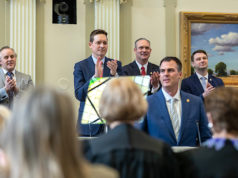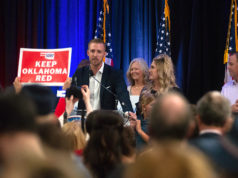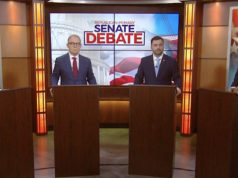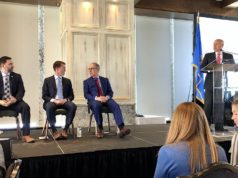(Editor’s note: This week, NonDoc will publish pieces examining the seven state questions on this November’s Oklahoma ballot. The pieces are presented in a “filter” format that attempts to answer key questions about the measures and any campaigns being run for or against them. We have already published pieces on SQ 776, SQ 777, SQ 779, SQ 780 & 781.)
In a nutshell, the separation of church and state: Are you for or against it?
State Question 790 asks voters to either repeal or uphold Article 2, Section 5 of the Oklahoma Constitution:
No public money or property shall ever be appropriated, applied, donated, or used, directly or indirectly, for the use, benefit, or support of any sect, church, denomination, or system of religion, or for the use, benefit, or support of any priest, preacher, minister, or other religious teacher or dignitary, or sectarian institution as such.
Voting “yes” on SQ 790 means that one supports the repeal (removal) of this prohibition, while voting “no” indicates the desire to keep it in place. Even if voters approve the repeal of this specific constitutional language, it is likely the U.S. Supreme Court will overturn it, as noted by OKPolicy.org.
Background
Oklahoma’s Article 2, Section 5 is often referred to as a Blaine amendment in reference to 19th-century federal lawmaker James G. Blaine. Piggybacking on the position of then-president Ulysses S. Grant, Blaine sought to add language to the U.S. Constitution barring state support of sectarian schools, specifically Catholic schools, which at the time served large immigrant populations. While Blaine’s amendment failed at the federal level, no less than 38 state constitutions subsequently adopted similar provisions, hence the reference.
Fast-forward about 200 years, and SQ 790 appears on the ballot largely due to controversy in 2015 surrounding the placement of a Ten Commandments monument on Capitol grounds. The American Civil Liberties Union of Oklahoma protested the placement of the monument on state property, and the case went all the way to the Oklahoma Supreme Court. That court overturned a district court’s ruling and found in favor with the plaintiffs that placement of that statue on state-owned grounds was unconstitutional.
In the embedded document below, one can see how a back-and-forth with Oklahoma Attorney General Scott Pruitt’s office resulted in his office’s addition of language that includes a reference to the Ten Commandments monument that was removed. The AG’s revision also notes that, if passed, Oklahoma would still be required to adhere to church-state separations as laid out in the U.S. Constitution.
Support for SQ 790
Politicians who favor SQ 790 include House Speaker Jeff Hickman (R-Fairview), Rep. Randy Grau (R-Edmond) and Rep. John Paul Jordan (R-Yukon), who co-authored the original Senate Joint Resolution 72 in April and, in October, called Article 2, Section 5 “a cancerous tumor.”
Likewise, the conservative group OCPA Impact favors repeal, and its parent organization, the Oklahoma Council of Public Affairs, currently hosts the displaced commandments monument on its property.
Meanwhile, religious leaders supporting 790 include the executive director of the Baptist General Convention of Oklahoma, Anthony L. Jordan, and Archbishop Paul S. Coakley of the Catholic Archdiocese of Oklahoma City.
In the media, a recent editorial in The Oklahoman cites instances in other states where the work of ostensibly benign organizations (Boy Scouts of America, religiously affiliated halfway houses) was challenged for having religious elements. The op-ed also refers to the original intent of the constitutional language as being patently and specifically anti-Catholic, in turn requiring an updated re-interpretation.
Last, a privately registered domain at OklahomaBlaine.org lays out opposition based on two lawsuits against religiously affiliated service providers in Oklahoma. That page notes that the state’s Supreme Court dismissed one such suit and found in favor of the defendants (i.e. a religiously affiliated school) in the other.
Opposition to SQ 790
Traditional media outlets opposed to 790 include the Muskogee Phoenix and Tahlequah Daily Press, the latter of which emphasized Pruitt’s “tampering” of the original language as “playing politics.” Grassroots opponents of SQ 790 also appear active on social media: A Facebook page called Oklahomans for Separation of Church and State had 785 likes as of noon Wednesday, while another, No on SQ 790, had 277.
Beyond specifically related movements, Oklahomans for Public Education made its stance clear with a Facebook post earlier this month:
The post highlights the group’s stance that the Ten Commandments monument is merely a red herring to obscure the larger implications of repealing Article 2, Section 5. Chiefly, opponents fear repeal would pave the way for a school voucher system, which many public education groups oppose. Because many private schools are religiously affiliated, a voucher system that uses public money to fund private-school tuitions would break the federal boundary between church and state.
OPE also posted opposition from a Baptist pastor in Norman:
Nationally, the executive director of the Baptist Joint Committee for Religious Liberty out of Washington, D.C., framed SQ 790 as a “dangerous road” in a NewsOK.com article from September. Last, as one might expect, the Freedom From Religion Foundation, ACLU and Council on American-Islamic Relations, which hosted a SQ 790 forum earlier this month, all oppose SQ 790.
